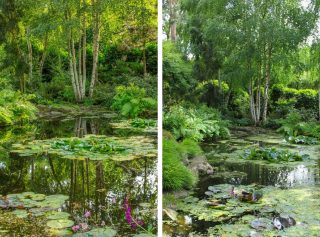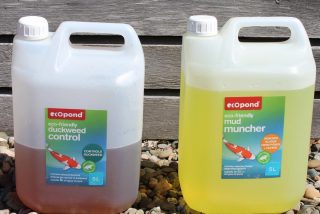Duckweed Control
Last month, we reported on water lily planting as a means of algae control in ponds. This month, we have found ourselves facing the hitherto unencountered issue of duckweed ‘infestation’.
Duckweeds (Lemnoideae), also called water lentils or water lenses, are a subfamily of aquatic plants which float on the surface of still or slow-moving fresh water. They are very simple structures without apparent leaves or stems, which reproduce vegetative by budding.
As they are high in protein content, in the wild, duckweeds are an important food source for waterfowl, hence the name.
Excessive growth of duckweed indicates a high nutrient content in the water.
There has always been some common duckweed (Lemna minor) in our ponds. This year, however, we noted a hugely increased amount which, after our weekly routine cleaning, seemed to grow back overnight.

The only explanation we could come up with was that the incessant rains of the last winter must have washed nutrients off the surface of the Stroll Garden bank (onto which we had applied a generous helping of leaf compost in December) into the water. This would have increased the nutrient content and therefore provided ideal conditions for the duckweed.

Clearing out the duckweed is possible, but very time-consuming. Also, every time it had been taken out, the duckweed would be back the next day. So, we had to go searching for a better remedy. We discovered two eco-friendly products which sounded promising: Duckweed Control contains a specialist bacterial culture which removes nutrients key to the growth of the duckweed from the water. As a result, the re-growth of duckweed is slowed down. Mud Muncher contains concentrated micro-organisms that digest organic matter, including fallen leaves. This reduces the nutrient content of the water and thus inhibits the growth of duckweed and algae. Both products are harmless to animals and plants. They are applied in a similar way as our tried and tested barley straw extract throughout the season. The Mud Muncher treatment continues throughout the autumn.

Although it is early days, we were delighted to see that, after only one week of treatment, the duckweed regrowth had visibly slowed down!

